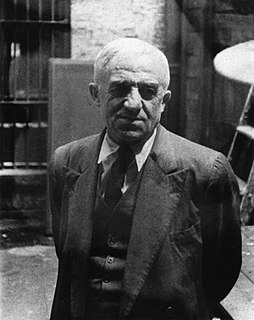A Quote by Ed Buckner
It is a deplorable fact that many Christians are so accustomed to a certain creed and dogma of their own that they will adhere to it even at the sacrifice of the great moral laws of love and mercy.
Related Quotes
We could try and establish a world in which the great and the powerful adhere to that international law which they require ordinary mortals to adhere to. In other words, there is one international law, and even America and even Russia and China and Japan must adhere to it, and Australia must adhere to it.
On the threshold of the moral world we meet the idea of Freedom, 'one of the weightiest concepts man has ever formed,' once a dogma, in the course of time a hypothesis, now in the eyes of many a fiction, yet we cannot do without it, even although we may be firmly convinced that our acts are determined by laws that cannot be broken.
In the first centuries of Christianity the hungry were fed at a personal sacrifice, the naked were clothed at a personal sacrifice, the homeless were sheltered at a personal sacrifice... And the pagans used to say about the Christians, "See how they love each other." In our own day the poor are no longer fed, clothed, and sheltered at a personal sacrifice, but at the expense of the taxpayers. And because of this the pagans say about the Christians, "See how they pass the buck."
Of course, there is nothing new about this kind of civil disobedience. It was seen sublimely in the refusal of Shadrach, Meshach and Abednego to obey the laws of Nebuchadnezzar because a higher moral law was involved. It was practiced superbly by the early Christians who were willing to face hungry lions and the excruciating pain of chopping blocks, before submitting to certain unjust laws of the Roman empire.
Theologians will protest that the story of Abraham sacrificing Issac should not be taken as literal fact. And the appropriate response is twofold: first, many, many people even to this day, do take the whole of their Scripture to be literal fact, and they have a great deal of political power over the rest of us, especially in the United States and in the Islamic world. Second, if not of literal fact, how should we take the story? As an alagory? Then an alagory for what? Surely, nothing praiseworthy. As a moral lesson? But what kind of morals could one derive from this appalling story?
In its primary signification, all vice, that is, all excess, brings on its own punishment, even here. By certain fixed, settled and established laws of Him who is the God of nature, excess of every kind destroys that constitution which temperance would preserve. The debauchee offers up his body a "living sacrifice to sin.
Conquered states that have been accustomed to liberty and the government of their own laws can be held by the conqueror in three different ways. The first is to ruin them; the second, for the conqueror to go and reside there in person; and the third is to allow them to continue to live under their own laws, subject to a regular tribute, and to create in them a government of a few, who will keep the country friendly to the conqueror
































